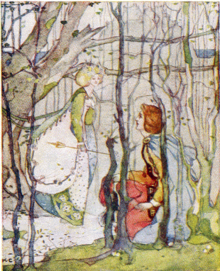
Back توماس الناظم Arabic Thomas Learmonth Breton Thomas Learmont Finnish Thomas le Rhymer French Tommaso di Ercildoune Italian Томас Лермонт Russian
Thomas the Rhymer | |
|---|---|
 From Thomas the Rhymer (retold by Mary MacGregor, 1908) "Under the Eildon tree Thomas met the lady," illustration by Katherine Cameron | |
| Born | Thomas de Ercildoun c. 1220 Erceldoune (Earlston), Berwickshire, Scotland |
| Died | c. 1298 (age about 78) |
| Nationality | Scottish |
| Other names | True Thomas, Thomas Learmouth/Learmonth/Learmount/Learmont/Learmounth, Thomas Rhymer/Rymour/Rymer, Thomas de Erceldoune/Ercildoun, Thomas Rymour de Erceldoune |
| Occupation | Laird |
| Known for | Prophecy |
| Children | Thomas de Ercildounson |
Sir Thomas de Ercildoun, better remembered as Thomas the Rhymer (fl. c. 1220 – 1298[1]), also known as Thomas Learmont or True Thomas, was a Scottish laird and reputed prophet from Earlston (then called "Erceldoune") in the Borders.[2] Thomas' gift of prophecy is linked to his poetic ability.
He is often cited as the author of the English Sir Tristrem, a version of the Tristram legend, and some lines in Robert Mannyng's Chronicle may be the source of this association. It is not clear if the name Rhymer was his actual surname or merely a sobriquet.[3]
In literature, he appears as the protagonist in the tale about Thomas the Rhymer carried off by the "Queen of Elfland" and returned having gained the gift of prophecy, as well as the inability to tell a lie. The tale survives in a medieval verse romance in five manuscripts, as well as in the popular ballad "Thomas Rhymer" (Child Ballad number 37).[4][5] The romance occurs as "Thomas off Ersseldoune" in the Lincoln Thornton Manuscript.[6]
The original romance (from c. 1400) was probably condensed into ballad form (c. 1700), though there are dissenting views on this. Walter Scott expanded the ballad into three parts, adding a sequel which incorporated the prophecies ascribed to Thomas, and an epilogue where Thomas is summoned back to Elfland after the appearance of a sign, in the form of the milk-white hart and hind. Numerous prose retellings of the tale of Thomas the Rhymer have been undertaken, and included in fairy tale or folk-tale anthologies; these often incorporate the return to Fairyland episode that Scott reported to have learned from local legend.
- ^ Tedder, Henry Richard (1889). . In Stephen, Leslie (ed.). Dictionary of National Biography. Vol. 17. London: Smith, Elder & Co.
- ^ Chambers 1826, p. 73; Chambers 1842, p. 6
- ^ Scott 1803, Minstrelsy, II, p.309. "Robert de Brunne" here is another name for Robert Mannyng. Scott goes on to quote another source from a manuscript in French, but Thomas of "Engleterre" is likely Thomas of Britain.
- ^ Child Ballad #37. "Thomas the Rymer", Child 1884, Pop. Ball. I, pp. 317–329
- ^ Child 1892, Pop. Ball. IV, p.454–5
- ^ Laing & Small 1885, pp. 82–83, 142–165.